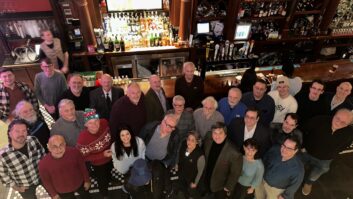We’ve reported that more FCC field offices will remain open and that the Society of Broadcast Engineers is pleased with that compromise.
Earlier, SBE had sent a letter to Chairman Wheeler about the proposed Enforcement Bureau restructuring, saying the plan “should be revisited following an opportunity for input by the stakeholders.” The letter is from SBE President Joseph Snelson, CPBE, 8-VSB. It was written well before the news of the compromise so it should be read in that light, but this stated the concerns of engineers so well that I share major excerpts here.

credit: iStockphoto/FangXiaNuo Dear Chairman Wheeler: It is my honor to serve as president of the Society of Broadcast Engineers Inc., a Washington, D.C., nonprofit association of broadcast and telecommunications professionals. I am writing you today because SBE’s Board of Directors and its membership of more than 5,000 technical professionals are very much concerned about the current proposal of the commission’s managing director and its Enforcement Bureau chief to reduce by two-thirds the number and distribution of FCC field offices and to reduce by approximately half the number of commission staff in those offices. …
Historically, broadcast engineers have had a close, positive and constructive working relationship with those field offices and with the very knowledgeable staff that is consistently responsive to the interference issues brought to them in real time. The field offices are already operating at well below efficient levels due to the longer-term effects of hiring freezes and attrition in the offices due to retirement of experienced staff. It is SBE’s view that the draconian cuts proposed now will have a substantially adverse effect on compliance in virtually all radio services. It will make the job of SBE’s volunteer frequency coordinators who facilitate sharing of broadcast and cable auxiliary spectrum between and among broadcasters and government agencies exceptionally difficult if not impossible …
“FUNDAMENTALLY UNFAIR”
SBE is fully aware that the commission is not statutorily obligated to consult the public before implementing an internal reorganization. … However, it is fundamentally unfair to those of us who stand to be profoundly adversely affected by a commission restructuring proposal to have no input into the process whatsoever. In this case, the contractor that the commission retained to examine the Enforcement Bureau’s operations and to make recommendations claimed to have contacted a wide variety of stakeholders in the process of developing its proposal. … No contact has been made by the contractor, however, with any representative of SBE or of the broadcast engineering community to the present time. You testified on April 30, 2015 before the House Subcommittee on Communications and Technology of the Committee on Energy and Commerce that “… thanks to the commission’s process reforms, the agency is more efficient, more transparent and more engaged with the public.” The means by which the Enforcement Bureau reorganization proposal was developed, however, was anything but transparent …
“NO SENSE OF URGENCY”
SBE is in agreement with you that the field offices could perhaps make better use of the limited time and resources available to them. There is time spent by field office staff doing random station inspections; checking to see whether tower fences are locked and checking to see whether a station’s public file contains all of the requisite paper documents. These types of activities are, at best, peripheral to the main function of the field offices and in fact the entire Enforcement Bureau, which is to protect the radio spectrum as a finite natural resource.
As it is, there is no sense of urgency in the commission’s spectrum enforcement activities. The field offices should be targeting spectrum polluters, such as power utilities with noisy power lines, unauthorized RF lighting devices (most especially RF lighting ballasts that preclude AM broadcast reception throughout entire communities at once) and pirate broadcasting. All of these enforcement problems severely plague radio broadcasters, but the few complaints that are investigated drag on for years at a time without resolution. Broadcasters are critical of the fact that the field offices are forced to spend their limited staff time doing things that are not related to the core function of interference resolution and which seem to be premised on the desire to issue large forfeitures rather than to deter rule violations and encourage compliance. At the same time, the commission apparently has no plan at all to deal with, for example, power line noise and the increasing ambient noise levels in the AM broadcast band from unlicensed devices that stand as an absolute bar to any AM revitalization effort.
The commission’s Web page currently identifies the mission of the field offices as follows:
The Enforcement Bureau’s Regional and Field Offices are our “eyes and ears” on the ground. Nearly half of EB’s staff is deployed in the three Regional Offices and 24 Field Offices around the country. This ubiquitous presence uniquely positions EB to assist the commission and other government agencies in resolving interference and unauthorized radio transmission cases. The Field also conducts routine on-site investigations, facilities inspections, audits of radio facilities, cable systems and antenna structures, provides disaster recovery support and assists in carrying out special priorities of the commission. In coordination with the Office of General Counsel, field agents also help the Department of Justice pursue in rem seizures of equipment used by unauthorized operators.
SBE is concerned that if the “ubiquitous presence” of FCC’s “eyes and ears” disappears from most of the areas and regions where there is now at least a minimal FCC presence, there will be a marked decrease in compliance among licensees and unlicensed individuals and groups. There is inherent value in having a visible, geographically diverse commission staff presence that can respond immediately to issues of interference to broadcast, public safety, interference to air-to-ground communications, etc. …
“VISIBLE COMMISSION PRESENCE”
As broadcast engineers and licensees in other radio services know all too well, a rule violation quickly addressed in a visible manner deters others from the same activity. Successful examples of commission enforcement are all based on this deterrence theory and it works very well. However, conversely, invisibility of FCC enforcement and allowing rule violations to fester for long periods encourages other rule violators. The commission cannot prevent interference between and among radio stations and users of the RF spectrum if there is no perception of an active, visible commission presence. The commission has not been at all visible or timely in, for example, the area of pirate broadcasting enforcement. Pirate broadcasting is at epidemic levels, most especially in California, Miami, New York and Boston. And the longer the pirates are allowed to broadcast undaunted, the more pirate broadcasting there will be. The closing of two-thirds of the field offices is antithetical to creating a level of deterrence that would keep pirate broadcasting at a maintenance level.
The EB’s deputy chief was recently quoted as saying that the $21 million it allegedly costs to keep the field offices and employees and equipment at current levels is too expensive and field office staffers have “too little work to do.” That is completely at variance with our current understanding of the level of workload of the field office staff; our understanding of the circumstances is that the offices’ staffs are spread so thin as it is that they don’t have time to do anything but the highest priority spectrum enforcement field work. While we are sympathetic to a goal of reducing the level of managers in the field offices, there are numerous alternatives to reducing the geographic distribution of commission staff in the field, none of which seem to have been considered by your contractor. SBE is not overly concerned about the offices themselves or the managers of those offices, but we are very much opposed to the reduction in the number of technical staff in the field. The commission allows its Washington staff to telecommute and there is no reason why the field office technical staff should not be permitted to work from residences or limited office facilities with direct reporting arrangements with the regional offices but with a greater degree of autonomy than heretofore. In this way the visibility of the commission can be preserved while reducing costs. This is but one idea. There are others that should be considered in a transparent process.
SBE would offer its resources as a partner in this process and we look forward to a dialogue with the Enforcement Bureau. We urge in the strongest terms, however, to avoid a rush to judgment in this process, which is irreversible and one that the commission cannot afford to get wrong.
Comment on this or any article. Write to[email protected]with Letter to the Editor in the subject field.











